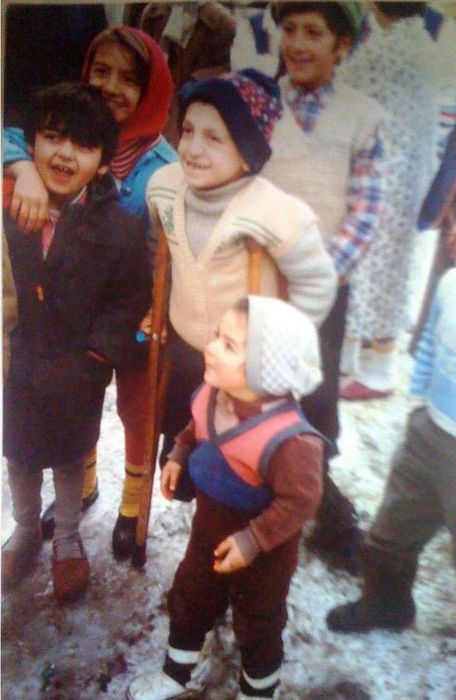I was 27 years old when I first saw what I looked like in my early childhood. We happened to find the only picture of me as a child at the home of one of our former neighbors. Before that photograph was discovered, I had no idea how I looked before going to school. It was war and that war had reduced our possessions to ashes… even my childhood photographs.
But one thing that the war left me in abundant supply with were memories of it… a legacy that I would never have wanted to possess… In that childhood photograph, we were not in the basement. Stepanakert had not been bombed at the time, the air raid sirens had not sounded. That meant we could leave the shelter where we would sing and dance on our makeshift stage which was just a chair, and we could play “real games” in the yard.
I remember that my mother took me with her to the military hospital in Stepanakert to look for my father’s name in the lists of freedom fighters that had been wounded or killed in action. My mother went through those lists, while I stood with other kids my age a few steps away, staring with shimmering eyes at Caroline Cox, who had just given us several colorful pieces of candy, wrapped in crinkly paper. I felt like I knew Cox’s name from the day I was born; nobody had told me about her, nobody had explained why she kept coming to Karabakh. I knew all of it by heart – she was a foreigner, a kind lady with colorful clothes that brought candy to children and medicine for freedom fighters.
In the photograph, where I’m staring at that kind lady with awe and joy, the person standing next to me in crutches is my childhood friend Shirin. One day, he had slipped out of the basement without permission to play in the yard and a rocket had exploded near him, damaging his foot. One year after that injury, Shirin was playing on his crutches in the yard when he fell and never opened his eyes again. That was how Shirin died…
I was never going to play with Shirin again, we were never going to recite poems together, using an empty bottle as a microphone and interviewing each other with questions like what do you want to be when you grow up… When I lost Shirin, I lost the childhood that I never had…
And it was only many years later that I understood that I had not had a childhood, when I discovered that I had not watched any cartoons, I never had any dolls, I had never worn colorful clothes, my shoes were always too big for me, as they had been in that photograph…
Just 21 days ago, I was convinced that my childhood had been the bleakest and the war I had seen the cruelest, that the daily news of the death of a 5-6-year-old friend, a parent, other relatives had all hardened me. I thought that I had developed immunity towards war… But no, you cannot develop antibodies to war, I am having the very same “symptoms” now, thousands of kilometers from home – I curl up at each piece of news about shelling. I lock myself into a corner as I did in the basement. I sense the same humidity from the walls, jumping at every sound, fearful of the wind’s whistling, which reminds me of planes right before a bomb hits. I go to sleep every night with the hope that I will wake up in the morning and this nightmare will be gone, but the nightmare continues even when it is dark…
P.S. The smallest girl in the photograph is my younger sister. My mother told her that my father died in the war so that she could have a life of calm and peace. The little girl in this photograph is continuing her father’s work now… She does not remember what her father was like, not even his face. But I remember that my father would enter the house in his army uniform, just like my sister does now, and, a few minutes later he would leave again, to get back to “his work”.


